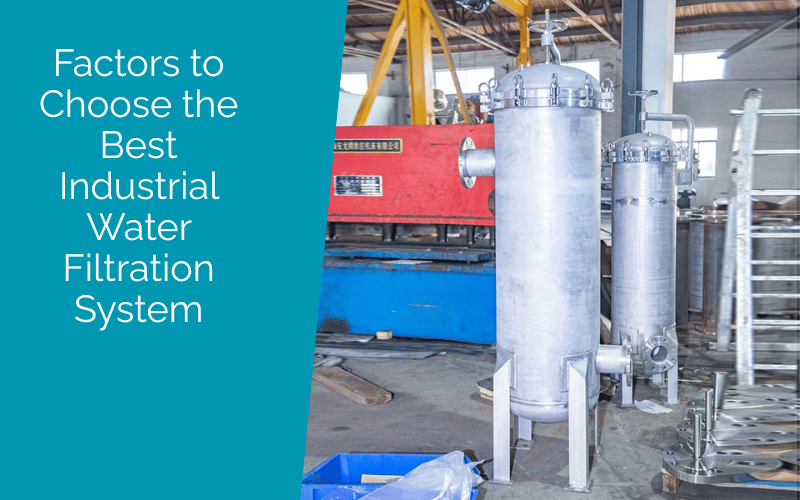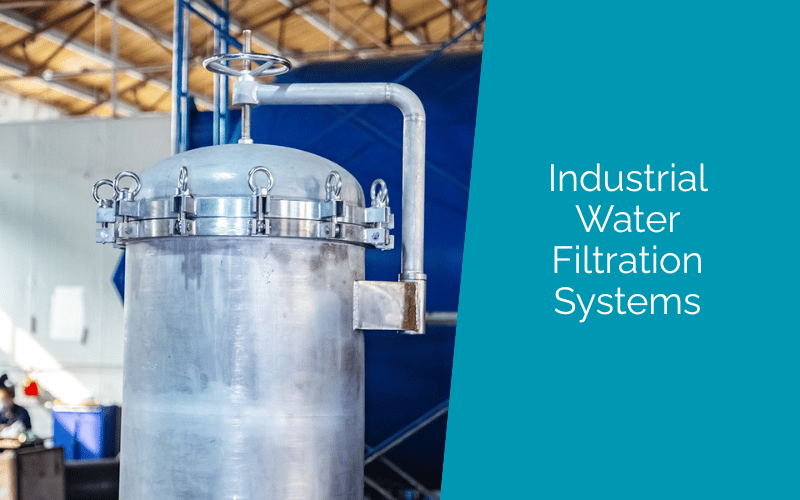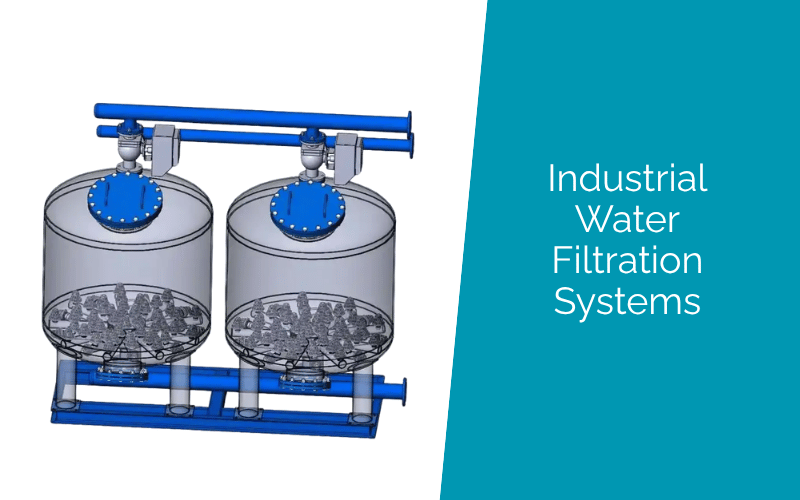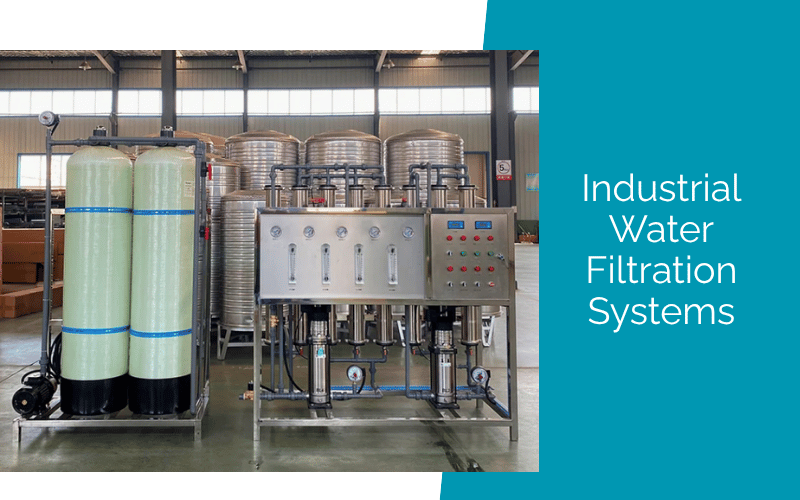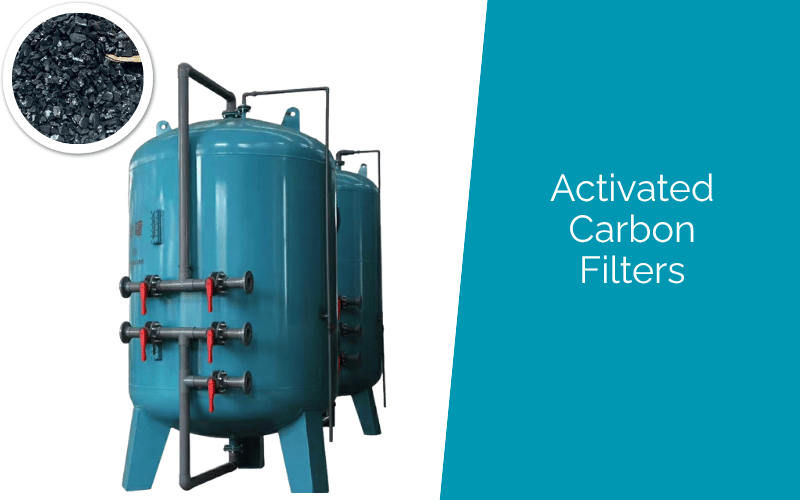Water filtration plays a crucial role in industrial operations, ensuring the removal of impurities to protect equipment, maintain product quality, and comply with regulatory standards. However, selecting the right filtration system can be challenging due to the wide range of options and varying application needs. This guide aims to simplify the decision-making process by providing actionable insights to help you choose the most effective solution for your specific requirements.
Table of Contents
ToggleWhat Are Industrial Water Filtration Systems?
Industrial water filtration systems are specialized setups designed to remove impurities, contaminants, and suspended solids from water used in industrial processes. These systems employ various filtration methods, including mechanical, chemical, and biological processes, to ensure that water meets the specific quality standards required for different applications. By filtering out unwanted particles, these systems help industries maintain the integrity of their operations while reducing the risk of equipment damage and process inefficiencies.
Unlike standard household filters, industrial systems are built to handle large volumes of water and are tailored to meet the unique demands of industrial environments. Whether it’s removing sediment, oils, or dissolved chemicals, these systems are essential for ensuring that water is clean, safe, and suitable for its intended use.
The Role of Filtration in Equipment Efficiency and Water Quality
Industrial water filtration systems play a vital role in maintaining the efficiency of equipment and the overall quality of water used in operations. Contaminants like dirt, scale, and organic matter can accumulate in machinery, leading to clogs, corrosion, and reduced performance. For example, in cooling towers, unfiltered water can cause scaling and biofilm buildup, which decreases heat transfer efficiency and increases energy consumption. Similarly, in boiler systems, untreated water can lead to deposits that reduce thermal efficiency and increase maintenance costs.
By removing these impurities, filtration systems protect critical equipment, extend its lifespan, and minimize downtime. Additionally, they ensure that water quality meets the specific requirements of industrial processes, whether it’s for direct use in production or as part of a treatment process. This not only improves operational efficiency but also helps industries comply with environmental regulations and sustainability goals.
Common Applications of Industrial Water Filtration Systems
Industrial water filtration systems are used across a wide range of applications, each with unique requirements:
- Cooling Towers: Filtration systems remove debris, algae, and scale-forming particles to maintain efficient heat exchange and prevent fouling in cooling systems.
- Boiler Feedwater: These systems filter out impurities like dissolved solids and minerals to prevent scaling and corrosion in boilers, ensuring optimal performance and energy efficiency.
- Wastewater Treatment: Filtration systems are essential for removing suspended solids, oils, and other contaminants from wastewater before it is discharged or reused, helping industries meet environmental compliance standards.
- Food and Beverage Production: In this sector, filtration ensures that water used in production processes is free from impurities that could affect product quality or safety.
- Pharmaceutical Manufacturing: Filtration systems provide ultrapure water required for drug production, ensuring compliance with stringent quality standards.
By addressing the specific needs of these applications, industrial water filtration systems contribute to smoother operations, reduced costs, and improved sustainability across various industries.
How Do Industrial Water Filtration Systems Work?
Overview of How Different Filtration Systems Operate
Industrial water filtration systems use various technologies to remove impurities, each tailored to specific types of contaminants and applications. These systems work by passing water through one or more filtration stages, where physical, chemical, or biological processes separate unwanted particles, dissolved substances, or microorganisms. Below is an explanation of some commonly used filtration methods:
Sand Filters: Effective for Removing Suspended Solids
Sand filters are one of the simplest and most widely used filtration systems. They operate by passing water through layers of sand and gravel, which trap suspended solids and larger particles. As water flows downward, the sand acts as a physical barrier, capturing debris while allowing clean water to pass through. These filters are commonly used in cooling towers, irrigation systems, and pre-treatment stages for other filtration methods.
Reverse Osmosis: Removing Dissolved Contaminants
Reverse osmosis (RO) systems use a semi-permeable membrane to remove dissolved salts, minerals, and other impurities from water. Water is forced through the membrane under high pressure, leaving contaminants behind and producing purified water. RO systems are highly effective for applications that require high-purity water, such as pharmaceutical manufacturing, boiler feedwater treatment, and desalination. However, they require pre-filtration to remove larger particles that could damage the membrane.
Activated Carbon Filters: Absorbing Organic Compounds and Chemicals
Activated carbon filters use porous carbon media to adsorb organic compounds, chlorine, and other chemical impurities from water. As water flows through the carbon bed, contaminants adhere to the surface of the carbon particles, leaving the water cleaner and free of unpleasant tastes or odors. These filters are often used in food and beverage production, as well as in industries requiring water free from chemical residues.
Multi-Stage Systems: Combining Technologies for Comprehensive Filtration
Many industrial applications require multi-stage filtration systems that combine different technologies to address a wide range of contaminants. For example, a system might use sand filters for removing suspended solids, followed by activated carbon filters to eliminate organic compounds, and finish with reverse osmosis for high-purity water. This layered approach ensures thorough filtration and meets the specific needs of complex industrial processes.
Visualizing the Filtration Process
- Input Water: Water enters the system, often containing suspended solids, dissolved salts, and organic impurities.
- Pre-Filtration (e.g., Sand Filter): Larger particles and debris are removed in the first stage.
- Chemical Filtration (e.g., Activated Carbon): Organic compounds, chlorine, and odors are adsorbed.
- Advanced Filtration (e.g., Reverse Osmosis): Dissolved salts and fine impurities are separated, producing purified water.
- Output Water: Clean water exits the system, ready for industrial use.
This step-by-step process highlights how different filtration technologies work together to deliver clean, high-quality water for industrial applications.
7 Key Factors to Consider When Choosing a System
1. Contamination Level: Assessing Impurities in the Water
Understanding the type and level of impurities in your water is the first step in selecting the right filtration system. Conduct a thorough water analysis to identify contaminants such as suspended solids, dissolved salts, organic compounds, or microorganisms. For example, water with high levels of sediment may require a sand filter, while water containing dissolved chemicals might need reverse osmosis or activated carbon filtration. Matching the system to the contamination level ensures effective treatment and prevents over- or under-engineering the solution.
2. Filtration Capacity: Meeting Volume and Flow Rate Needs
The filtration capacity of a system must align with the volume of water you need to treat and the required flow rate. High-volume industrial processes, such as cooling towers or wastewater treatment, demand systems capable of handling thousands of gallons per hour. Conversely, smaller operations may only require moderate flow rates. Ensure the system can maintain consistent performance under peak demand without compromising efficiency. Oversizing or undersizing the system can lead to operational inefficiencies and increased costs.
3. Quality Requirements: Matching the System to Desired Water Standards
Different applications require varying levels of water quality, and your filtration system should meet these specific standards. For instance, potable water must comply with health and safety regulations, while industrial processes may only need water free of large particles. In pharmaceutical or electronics manufacturing, ultrapure water is essential, necessitating advanced filtration technologies like reverse osmosis or ultrafiltration. Clearly defining your quality requirements helps narrow down the options and ensures compliance with industry standards.
4. Process Specifications: Considering Operating Conditions
Operating conditions such as temperature, pressure, and flow rate play a critical role in system selection. Some filtration systems, like reverse osmosis, require high pressure to function effectively, while others, such as sand filters, operate under lower pressure. Similarly, high-temperature applications may need filters made from heat-resistant materials. Ignoring these specifications can lead to system failures or reduced efficiency, so it’s essential to choose a system designed to handle your specific process conditions.
5. Nature of Contaminants: Identifying Solid, Dissolved, or Biological Impurities
The type of contaminants in your water—whether solid, dissolved, or biological—determines the filtration technology you need. For example, suspended solids like dirt or debris can be removed with sand or bag filters, while dissolved salts require reverse osmosis. Biological contaminants, such as bacteria or algae, may necessitate UV disinfection or ultrafiltration. Understanding the nature of the impurities ensures that the system you choose effectively addresses your water treatment challenges.
6. Operating Costs: Balancing Investment and Maintenance
When evaluating filtration systems, consider not only the initial investment but also the ongoing operating costs. Maintenance, energy consumption, and replacement parts can significantly impact the total cost of ownership. For instance, while reverse osmosis systems provide high-quality filtration, they consume more energy and require regular membrane replacements. On the other hand, sand filters have lower operating costs but may not meet stringent water quality requirements. Balancing upfront costs with long-term expenses helps you make a cost-effective decision.
7. Wastewater Disposal Costs: Managing Waste Handling
Filtration systems generate waste, whether it’s concentrated brine from reverse osmosis or sludge from sediment filters. Properly handling and disposing of this waste can add to operational costs, especially in industries with strict environmental regulations. Evaluate the volume and type of waste your system will produce and factor in the costs of disposal or treatment. For example, industries in water-scarce regions may benefit from systems that minimize wastewater, such as closed-loop filtration setups.
By carefully considering these seven factors, you can select a water filtration system that meets your operational needs, ensures compliance with quality standards, and optimizes cost-efficiency.
Types of Industrial Water Filtration Systems
Overview of Common Filtration Systems
Industrial water filtration systems come in various types, each designed to address specific filtration needs. Below is a detailed explanation of the most commonly used systems:
Activated Carbon Filters: Removing Organic Compounds and Improving Taste/Odor
Activated carbon filters are highly effective at adsorbing organic compounds, chlorine, and other chemicals that affect water quality. These filters use porous carbon media to trap impurities, improving the taste and odor of water. They are widely used in food and beverage production, as well as in applications requiring chemical-free water.
Reverse Osmosis: Achieving High-Purity Water and Desalination
Reverse osmosis (RO) systems use a semi-permeable membrane to remove dissolved salts, minerals, and other impurities. By applying high pressure, water is forced through the membrane, leaving contaminants behind. RO is ideal for applications requiring ultrapure water, such as pharmaceutical manufacturing, electronics production, and seawater desalination.
Sand Filters: Removing Large Particles and Sediments
Sand filters are simple yet effective systems that use layers of sand and gravel to trap suspended solids and larger particles. These filters are commonly used in cooling towers, irrigation systems, and as a pre-treatment step for other filtration methods. Their low maintenance and cost-effectiveness make them a popular choice for large-scale operations.
Bag Filters: Flexible and Cost-Effective Filtration
Bag filters are versatile systems that use fabric bags to capture debris, sediment, and other impurities. They are easy to install, maintain, and replace, making them a cost-effective solution for industries like wastewater treatment, agriculture, and chemical processing. Bag filters are available in various micron ratings to suit different filtration needs.
Cartridge Filters: High Flow Rates with Low-Pressure Drops
Cartridge filters are cylindrical filters designed for high flow rates and minimal pressure drops. They are often used in applications requiring fine filtration, such as removing small particles or polishing water after primary treatment. These filters are available in disposable or reusable options, depending on the application.
Centrifugal Filters: Separating Solids Using Centrifugal Force
Centrifugal filters use the principle of centrifugal force to separate solids from liquids. Water enters the system at high speed, causing heavier particles to move outward and settle, while clean water exits the system. These filters are ideal for applications with high solid loads, such as mining, agriculture, and industrial cooling systems.
Basket Strainers: Protecting Equipment by Trapping Large Particles
Basket strainers are mechanical filters designed to trap large particles and debris, protecting downstream equipment like pumps and valves. They are commonly used in pipelines and industrial systems where preventing equipment damage is critical. Basket strainers are easy to clean and maintain, making them a practical choice for heavy-duty applications.
Comparison Table for Quick Reference
| Filtration System | Key Features | Common Applications |
|---|---|---|
| Activated Carbon Filters | Removes organic compounds, improves taste/odor | Food & beverage, chemical-free water |
| Reverse Osmosis | High-purity water, removes dissolved salts | Pharmaceuticals, electronics, desalination |
| Sand Filters | Traps large particles and sediments | Cooling towers, irrigation, pre-treatment |
| Bag Filters | Flexible, cost-effective, various micron ratings | Wastewater, agriculture, chemical processing |
| Cartridge Filters | High flow rates, low-pressure drops | Fine filtration, water polishing |
| Centrifugal Filters | Separates solids using centrifugal force | Mining, agriculture, industrial cooling |
| Basket Strainers | Traps large particles, protects equipment | Pipelines, heavy-duty industrial systems |
This table provides a quick overview of the key features and applications of each filtration system, helping you identify the most suitable option for your specific needs.
Benefits of Industrial Water Filtration
Prolonged Equipment Lifespan
Industrial water filtration systems play a crucial role in extending the lifespan of equipment by preventing the buildup of harmful contaminants. Unfiltered water often contains particles like sediment, scale, and organic matter that can accumulate in machinery, leading to clogs, corrosion, and wear over time. For example, in cooling towers, untreated water can cause scaling and biofilm formation, which reduces heat transfer efficiency and damages system components. By removing these impurities, filtration systems protect critical equipment, ensuring smooth operation and reducing the likelihood of costly breakdowns. This not only enhances the durability of machinery but also minimizes the need for frequent replacements, saving businesses significant capital in the long run.
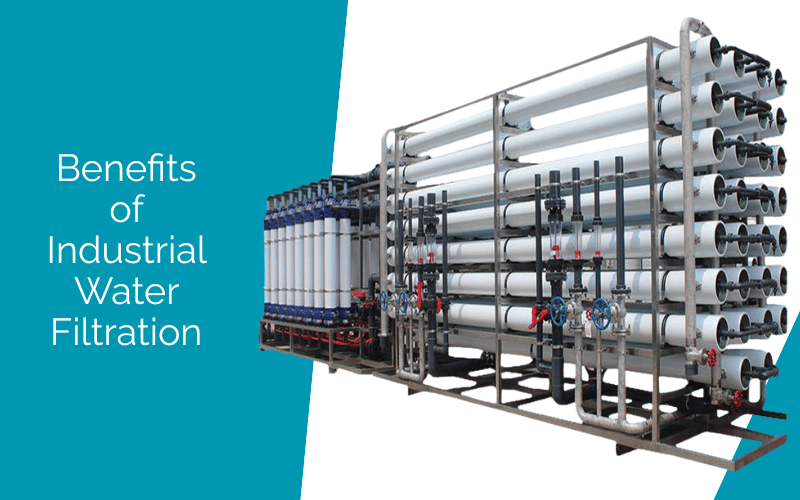
Reduced Maintenance Costs
Effective water filtration significantly lowers maintenance expenses by reducing the frequency and intensity of equipment servicing. Contaminants in water can lead to fouling, scaling, and blockages, necessitating regular cleaning and maintenance to ensure system efficiency. For instance, boilers using untreated water often experience scaling, which decreases thermal efficiency and increases energy consumption. Filtration systems address these issues by removing impurities before they reach the equipment, reducing the need for labor-intensive maintenance. Additionally, by preventing damage to components like pumps, valves, and heat exchangers, filtration systems help businesses avoid unexpected repair costs and downtime, ensuring uninterrupted operations.
Improved Product Quality
Water quality has a direct impact on the quality of products in industries such as food and beverage, pharmaceuticals, and electronics manufacturing. Contaminated water can introduce impurities that compromise the safety, taste, or functionality of the final product. For example, in the food industry, water with high levels of chlorine or organic compounds can alter the flavor of beverages or processed foods. Similarly, in pharmaceutical production, ultrapure water is crucial for meeting stringent regulatory standards and ensuring the efficacy of medications. Industrial water filtration systems remove unwanted particles, chemicals, and microorganisms, ensuring that water meets the specific quality requirements of each application. This not only enhances product consistency but also helps businesses maintain customer trust and comply with industry regulations.
Environmental Sustainability
Industrial water filtration systems contribute to environmental sustainability by reducing water waste and minimizing the release of harmful contaminants into the environment. Many filtration systems, such as reverse osmosis and bag filters, enable water reuse by removing impurities, allowing industries to recycle water for various processes. This reduces the demand for fresh water, conserving valuable resources and lowering operational costs. Additionally, by treating wastewater before discharge, filtration systems help industries comply with environmental regulations and prevent pollution of natural water bodies. For example, removing heavy metals, oils, and suspended solids from wastewater ensures that it meets discharge standards, protecting ecosystems and public health. By integrating efficient filtration systems, businesses can align their operations with sustainability goals while reducing their environmental footprint.
Applications of Water Filtration in Industry
Manufacturing Processes: Ensuring Operational Efficiency
Water filtration is a critical component in various manufacturing processes, where clean water is essential for maintaining operational efficiency and product quality. Industries such as automotive, textiles, and electronics rely on filtered water to prevent contaminants from interfering with their production processes. For example, in metalworking, unfiltered water can introduce particles that damage machinery or compromise the surface finish of products. Similarly, in electronics manufacturing, ultrapure water is required to clean components without leaving residues. By removing impurities such as sediment, oils, and dissolved solids, filtration systems ensure smooth operations, reduce equipment wear, and enhance the overall quality of manufactured goods.
Food and Beverage Production: Maintaining Safety and Flavor
In the food and beverage industry, water quality has a direct impact on the safety, taste, and consistency of products. Filtration systems are used to remove chlorine, organic compounds, and microorganisms that could alter the flavor or compromise hygiene standards. For instance, breweries and soft drink manufacturers rely on activated carbon filters to eliminate unwanted tastes and odors, ensuring a consistent product. Additionally, water used for cleaning equipment and packaging must meet strict quality standards to prevent contamination. By integrating advanced filtration technologies, food and beverage producers can maintain compliance with health regulations while delivering high-quality products to consumers.
Pharmaceutical Operations: Achieving Ultrapure Water Standards
Pharmaceutical manufacturing requires water of the highest purity to meet stringent regulatory standards and ensure the safety and efficacy of medications. Filtration systems play a vital role in removing particles, bacteria, and dissolved impurities from water used in drug formulation, cleaning, and sterilization processes. Reverse osmosis and ultrafiltration are commonly employed to achieve ultrapure water, which is free from contaminants that could compromise product quality. For example, injectable drugs and intravenous solutions require water that meets stringent microbial and chemical purity standards. By using advanced filtration systems, pharmaceutical companies can ensure compliance with industry standards and protect patient safety.
Power Generation: Protecting Equipment and Enhancing Efficiency
In the power generation sector, water filtration is essential for maintaining the efficiency and reliability of equipment such as boilers, cooling towers, and turbines. Contaminants in water can cause scaling, corrosion, and fouling, leading to reduced performance and increased maintenance costs. For example, in thermal power plants, untreated water can form deposits on boiler tubes, reducing heat transfer efficiency and increasing energy consumption. Filtration systems, such as sand filters and reverse osmosis, remove impurities like suspended solids, dissolved salts, and organic matter, ensuring that water meets the specific requirements of each application. This not only protects critical equipment but also enhances overall operational efficiency.
Wastewater Treatment: Promoting Environmental Compliance
Water filtration is a cornerstone of wastewater treatment, enabling industries to meet environmental regulations and minimize their ecological impact. Filtration systems remove suspended solids, oils, heavy metals, and other contaminants from wastewater before it is discharged or reused. For example, in chemical processing plants, bag filters and activated carbon systems are used to treat effluents, ensuring that they meet discharge standards. Additionally, advanced filtration technologies enable water recycling, allowing industries to reduce freshwater consumption and minimize waste. By integrating effective wastewater treatment solutions, businesses can promote sustainability while avoiding penalties for non-compliance with environmental laws.
How to Choose the Right System
Step 1: Analyze Water Quality and Contaminants
The first step in selecting the right filtration system is to thoroughly analyze the quality of your water and identify the contaminants present. Conduct a detailed water test to determine the levels of suspended solids, dissolved salts, organic compounds, and microorganisms. Understanding the specific impurities in your water will help you choose a system that effectively addresses your needs. For example, if your water contains high levels of sediment, a sand filter or bag filter may be appropriate. On the other hand, if dissolved salts or chemicals are the primary concern, reverse osmosis or activated carbon filtration might be a better choice. This analysis ensures that the system you select is tailored to your water treatment challenges.
Step 2: Define Operational Requirements
Once you understand your water quality, define the operational requirements of your filtration system. Consider factors such as the volume of water to be treated, the required flow rate, and the desired water quality standards. For instance, industries requiring ultrapure water, such as pharmaceuticals or electronics manufacturing, will need advanced filtration technologies like reverse osmosis or ultrafiltration. Additionally, take into account the operating conditions, such as temperature and pressure, to ensure the system can handle your specific process demands. Clearly outlining these requirements will help you narrow down your options and avoid investing in a system that is either over-engineered or insufficient for your needs.
Step 3: Consult with Experts or Suppliers
Choosing the right filtration system can be complex, so it’s essential to consult with industry experts or trusted suppliers. Share your water analysis results and operational requirements with them to get professional recommendations. Experienced suppliers can guide you through the available options, explaining the advantages and limitations of each system. They can also help you understand the long-term costs, including maintenance, energy consumption, and replacement parts. For example, while reverse osmosis systems provide high-quality filtration, they may have higher energy requirements compared to other systems. By leveraging expert advice, you can make an informed decision that balances performance, cost, and efficiency.
Step 4: Test and Evaluate System Performance
Before fully committing to a filtration system, test and evaluate its performance to ensure it meets your expectations. Many suppliers offer pilot testing or trial installations, allowing you to assess the system’s effectiveness in real-world conditions. Monitor key metrics such as water quality, flow rate, and energy consumption during the trial period. For example, if you’re using a bag filter, check how effectively it removes sediment and how often the filter bags need replacement. Similarly, for reverse osmosis systems, evaluate the rejection rate of dissolved salts and the overall water recovery rate. Testing the system helps identify any potential issues and ensures that it delivers the desired results before making a significant investment.
FAQs
Q: What is the most cost-effective filtration system?
A: The most cost-effective filtration system depends on your specific needs and water quality. For applications requiring basic filtration, sand filters or bag filters are often the most economical due to their low initial cost and simple maintenance. However, for more complex requirements, such as removing dissolved salts or achieving ultrapure water, reverse osmosis may offer better long-term value despite higher upfront costs. Evaluating your operational needs and budget will help determine the best option.
Q: How often should filters be replaced?
A: The frequency of filter replacement depends on the type of system, water quality, and usage. For example, bag filters may need replacement every few weeks or months, depending on the level of contaminants. Cartridge filters typically last longer but should be replaced when pressure drops or flow rates decrease. Regular monitoring of system performance and following the manufacturer’s guidelines will ensure timely replacements and optimal efficiency.
Q: Can multiple systems be combined for better results?
A: Yes, combining multiple filtration systems is often the best approach for addressing a wide range of contaminants. For instance, a multi-stage system might use a sand filter for removing large particles, followed by an activated carbon filter to eliminate organic compounds, and finish with reverse osmosis for high-purity water. This layered approach ensures comprehensive filtration and meets specific water quality requirements.
Q: What factors affect the lifespan of a filtration system?
A: Several factors influence the lifespan of a filtration system, including water quality, operating conditions, and maintenance practices. Systems exposed to high levels of contaminants or harsh conditions, such as extreme temperatures or pressures, may require more frequent maintenance and part replacements. Regular cleaning, timely filter changes, and proper system operation can significantly extend the lifespan of your filtration equipment.
Q: Are filtration systems environmentally friendly?
A: Many filtration systems are designed with sustainability in mind. For example, reverse osmosis systems can recycle water, reducing freshwater consumption, while bag filters and cartridge filters often use recyclable materials. Additionally, treating wastewater before discharge helps industries comply with environmental regulations and minimize their ecological impact. Choosing energy-efficient systems and maintaining them properly further enhances their environmental benefits.
Q: How do I know which filtration system is right for my industry?
A: To choose the right system, start by analyzing your water quality and identifying the contaminants present. Define your operational requirements, such as flow rate, water volume, and desired purity levels. Consulting with experts or suppliers can provide valuable insights and recommendations tailored to your industry. Testing a system before full implementation ensures it meets your specific needs.
Conclusion
Choosing the right industrial water filtration system is essential for maintaining operational efficiency, reducing costs, and ensuring compliance with quality standards. By understanding your water quality, defining operational needs, and consulting with experts, you can select a system that meets your specific requirements. Don’t leave your water filtration decisions to chance—contact us today for expert advice and tailored solutions to optimize your industrial processes.


